Student Composers
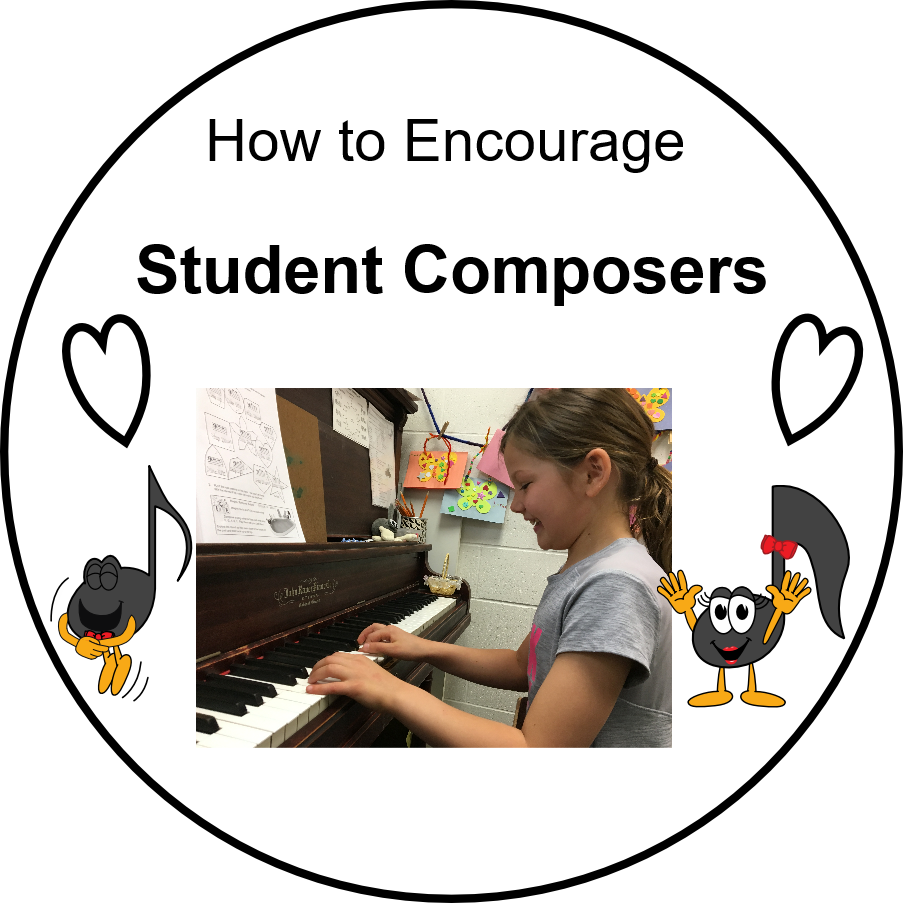
Ultimate Music Theory has the tools that Teachers need in order to teach and encourage their Students to become Student Composers!
What is a Student Composer?
A Student Composer is a student who sits down at their instrument and creates a piece of music. The Music can be as simple as a "melody" or as complicated as a "Sonatina". From 5 notes to 5 pages, any student can become a Student Composer!
A Student Composer can create their own Composition directly on the piano (Improvising) as a "one time play" or they can write out their own Composition (changing and editing until it is exactly what they want it to sound like).
How to Encourage Student Composers Tip #1 - ICE
ICE: Imagine - Compose - Explore
These 3 words have brought so much joy to my Studio. So, where are they found and what do they mean?
ICE is found in the Ultimate Music Theory Beginner A, B, C Series, beginning with the first ICE in the Music Theory Beginner A Workbook on Page 15. ICE is an exercise that develops creativity in Students and encourages them to, well, Imagine, Compose and Explore!
Students learn a concept in the Lesson, and then use ICE to apply their knowledge.
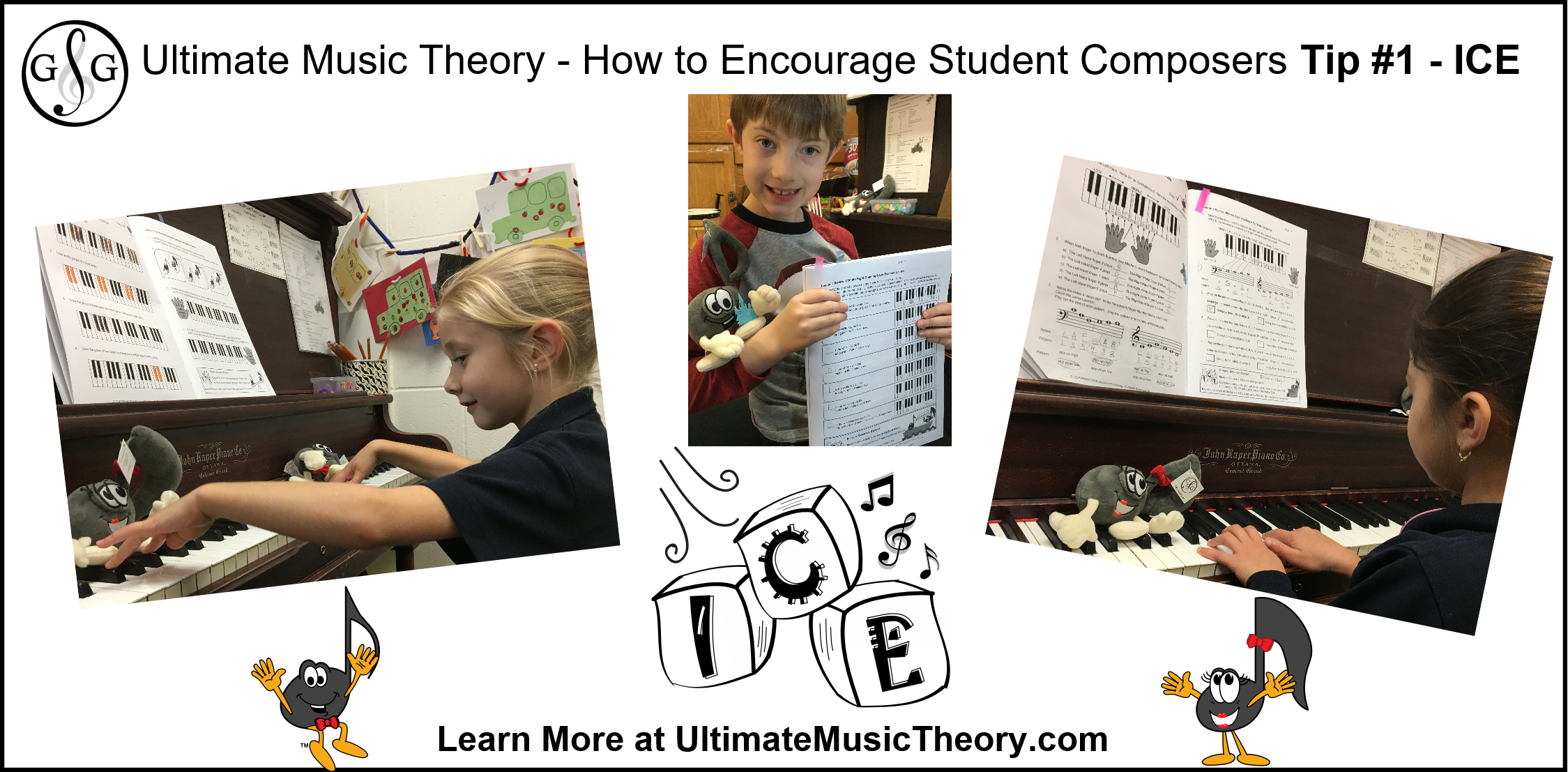
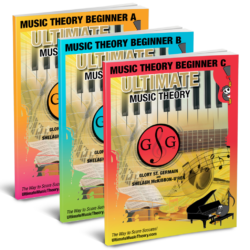
Student Composers Imagine, Compose, Explore - In the ICE exercises, Students are given a "scene" and they get to create the story and the music that accompanies their story.
For example, the very first ICE Exercise on Page 15 in the Music Theory Beginner A Workbook says:
- Imagine So-La and Ti-Do are playing on a Teeter Totter.
- Compose a song using the groups of 2 and 3 black keys.
- Explore the sound (pitch) as the Teeter Totter goes down LOW & up HIGH.
Just from these instructions, can you tell what concepts students have been studying on the previous pages? (Hint - the answer is "2 and 3 black keys", "sound (pitch)" and "down LOW & up HIGH". Did you get that?)
When my Students use the Music Theory Beginner A Workbook, I spend less than a minute demonstrating this first "ICE" Exercise... and then they get it!
How to Demonstrate "ICE":
To teach Students how to compose using ICE, I read the instructions and then I demonstrate by creating a little story. For example: So-La jumps up high on the teeter totter. Ti-Do jumps down low on the teeter totter. So-La goes up and Ti-Do goes down; Ti-Do goes up and So-La goes down. They go faster and faster until they both jump off! (I tell the story while I play the "sounds" on the piano.)
By reading my little story, can you "hear" how I am playing the groups of black keys?
I give the Students the chance to create their own stories. There is no "right or wrong"! There are no Time Signatures or Note Values. There is only Creativity!
True Story: My Student Connor finished his lessons yesterday. His dad came to get him. Connor JUMPED off the piano bench and said "Daddy! Guess What!
My Ti-Do Challenge is to do 6 Pages in my Music Theory Book and Guess What?! If I do them, there is an ICE on the last page!"
How To Encourage Student Composers Tip #2 - Write It Out!
There are times when a Student is so excited by their creativity, they want to write out their song. When this happens, don't you just get the "warm fuzzies of joy"? I know that I do.
In the photo, you see my little student Jake. This is Jake's first year of lessons.
He is still "pre-staff" (reading music using notes and letter names). Jake was so excited to present me with this song. His parents were very proud of him - he decided on his Time Signature, the rhythm and the notes all by himself.
When he handed me "Jake's Song" and then played it (from memory!) for me, I cried.
Yes, I know that a whole note does not need a line through it (when it is not Middle C). Yes, I know that the second line does not need a Time Signature. But so what! This is "Jake's Song" and he wrote it.
At this stage of Creativity, a student needs to hear "WOW, this is amazing",
and not "Wow, now let's fix those mistakes".
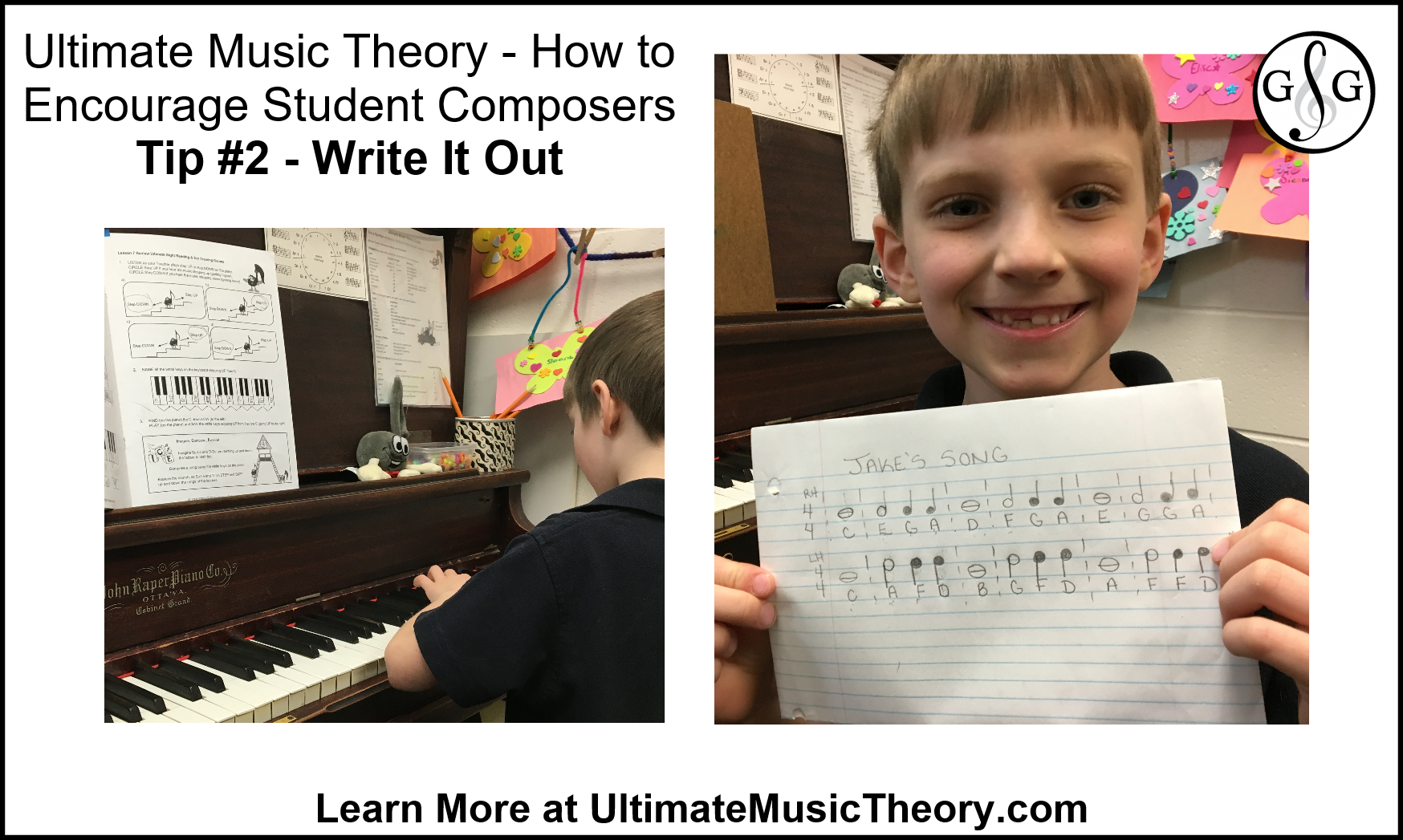
When a Student comes to me with a piece that they have composed - and they are ready to "take it to the next level", I will offer to write it out for them. (You can use your Computer and a music writing program, or you can write out the piece by hand on a piece of staff paper.) For Advanced Students, they can do the actual writing (by hand or using a computer program).
When you encourage a Student Composer, remember that the decisions about Time Signatures, Rhythms, Notes, Pitch and Values needs to be the Student's decisions.
The Teacher can encourage the Student by "directing" them to maintain correct musicality. This is important so that the Student learns to apply written theory concepts as they sit at the piano and compose.
In my Studio, my Students will have a "My Own Music" Book - a duotang or binder that we can save their Compositions in. I like to print their compositions and save them in plastic page protectors in their "MOM" Book.
How To Encourage Student Composers - Tip #3 - Perform!
Student Composers love to perform their Compositions. I would encourage Teachers to support your Students by providing them with opportunities to perform.
Check your local Music Festival Syllabus. Often there is a class for "Own Compositions". In this picture, Olivia Allen performed her own composition "Sonatina in C Major" and earned a Gold.
Olivia is the Student of my fellow Brockville Ontario Piano Teacher Anita Barrington. Olivia was really inspired by the Ultimate Music Theory Supplemental Level Workbooks. Understanding the rules of "Harmony" gave Olivia the foundation for composing. The result was "Sonatina in C Major", by Olivia Allen.
The Music Festival Adjudicator wrote
"This was composed with a good understanding of the form of the Sonata Allegro Format.
The counterpoint is creative and matches the style of the Classical Masters, especially Clementi, Kuhlau and Mozart."
Olivia was then invited to perform her own Composition at the Stars of the Music Festival Concert.
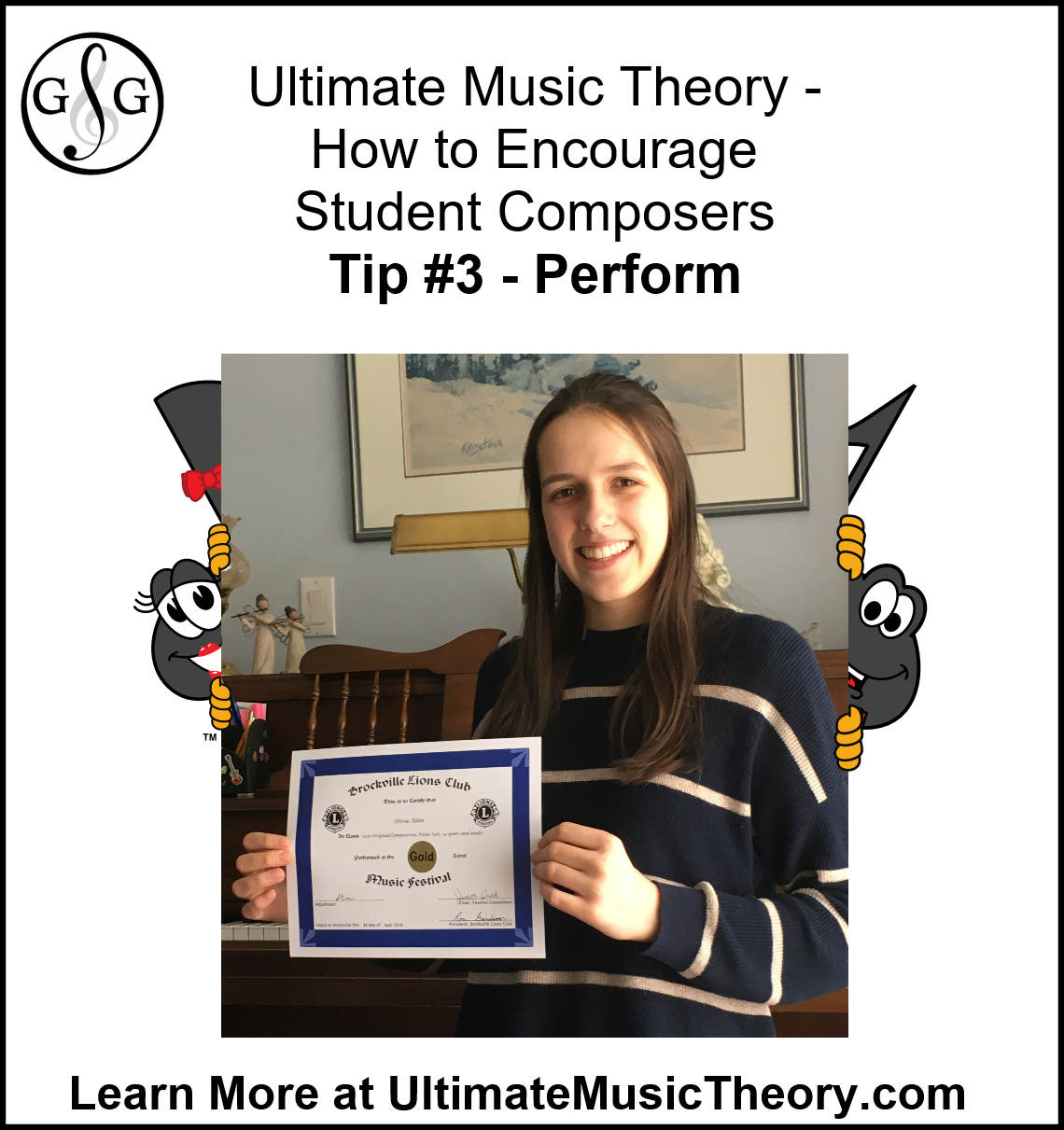
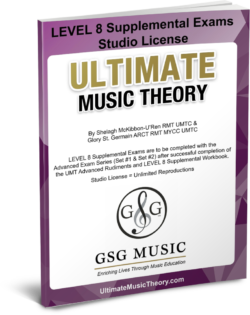
I was so impressed with how well Olivia applied the knowledge of harmony as taught in the Ultimate Music Theory Supplemental Workbooks.
I asked her if I could use her Sonatina in C Major as the analysis piece in the Level 8 Supplemental Exams. And she said YES!
It truly was an honour and a privilege for me to see how this Ultimate Music Theory Student used her theory knowledge to create her own composition.
Olivia is also performing her own Composition as a "Teacher's Choice" Etude on her Level 8 RCM Piano Exam!
NOTE: LEVEL 8 Supplemental Exams - The UMT Supplemental Exams are specifically designed to prepare students for successful completion of Nationally Recognized Music Theory Examinations including the Royal Conservatory of Music Theory Exams.
(For maximum learning, complete the Advanced Rudiments and LEVEL 8 Supplemental Workbooks followed by the Advanced Rudiments Exams Set #1 & Set #2 and Supplemental Exams LEVEL 8. Studio License - Unlimited Downloads!
How To Encourage Student Composers - Bonus Tip #1 - Examination Piece
Students preparing for an RCM Piano Exam, from the Preparatory A to the Level 9, can substitute an Own Composition for one of the etudes. There are other options for Teacher's Choice Substitutions. I find that the easiest way to incorporate a Student's Own Composition into their Exam program is to use it as an Etude.
The Student does NOT require permission from the RCM to substitute their Own Composition for an Etude. The Own Composition will be marked on the appropriateness of the Composition (in other words, it is of a similar length and "difficulty" as an Etude at the same level). It can be from any stylistic period.
Memorization is NOT required for Etudes. However, the Student MUST provide the Examiner with a legible written copy of their Composition. (If the Student uses their music, a second copy is required for the Examiner.)
How To Encourage Student Composers - Bonus Tip #2 - Recitals
Another opportunity for Students to perform their own Compositions is at a Recital. Recitals do not have to be held at Carnegie Hall. Here are some Performance Ideas:
- Perform at a Senior Center for the Residence. There is often an "Entertainment Coordinator" that you can contact. Seniors love having a "Tea Party" featuring entertainment by young children (and usually there is room for parents to attend).
- "Link Up" with a local not-for-profit agency and arrange for your Students to perform at one of their charity events. Place a "tip jar" on the piano (or beside the keyboard), with all tips going to the charity. (Charities often hold Garage Sales or Yard Sales, and it is my experience that they LOVE having this "free entertainment".)
- Some Malls have a "community room" or an area that members of the community can use. Find a local "cause" that you would like your studio to support and hold a "play-a-thon" to raise money.
If you have ideas for teachers who are not able to hold a recital in their studio/home, please post them in the Comments Section! Thanks.
How To Encourage Student Composers - Bonus Tip #3 - Facebook
If I have a Media Permission Form from my Student's Parents (the Parent has agreed that I may post pictures and videos of their child), I will celebrate their journey as a Student Composer by posting them performing their Own Composition.
It is very easy to set up a Facebook Group for your Studio. Just remember to always get signed permission from a parent to post pictures and videos of their child.
Thank you for exploring how to Encourage Student Composers in YOUR Studio! I would love to see and hear YOUR Student Composers! Please share them with us on the Ultimate Music Theory Group on Facebook!
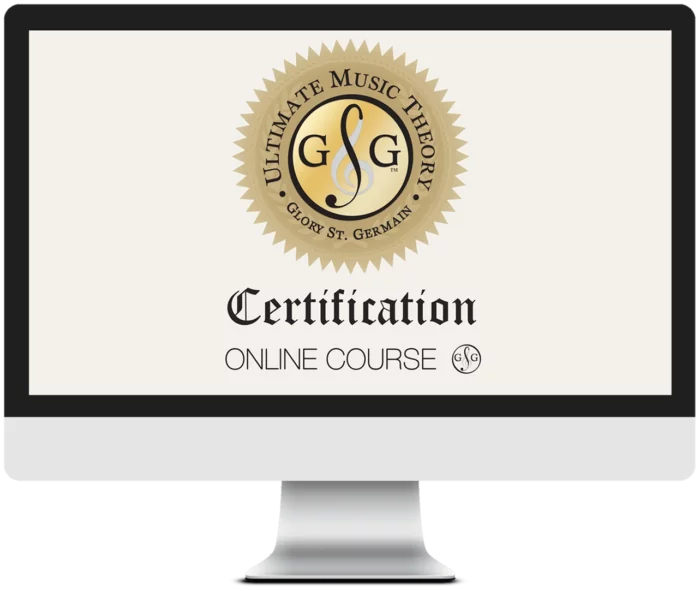
Ultimate Music Theory Certification Course Online Teacher Training includes: 50 Video Sessions, All Materials, Online Support,
Exam Marking & Certificate!
Click HERE to discover what you will learn in the Ultimate Music Theory Certification Course. Your professional development Online Teacher Training starts here.
Ultimate Music Teachers Membership
♪ LEARN ♪ PLAN ♪ TEACH ♪ GROW
The One & ONLY Ultimate Music Teachers Membership
To Become A UMT PRO!
Your Success Path Starts Here - Go To TeachUMT.com Today!
Keep on Learning... With a Smile and a Song!
Shelagh McKibbon-U'Ren
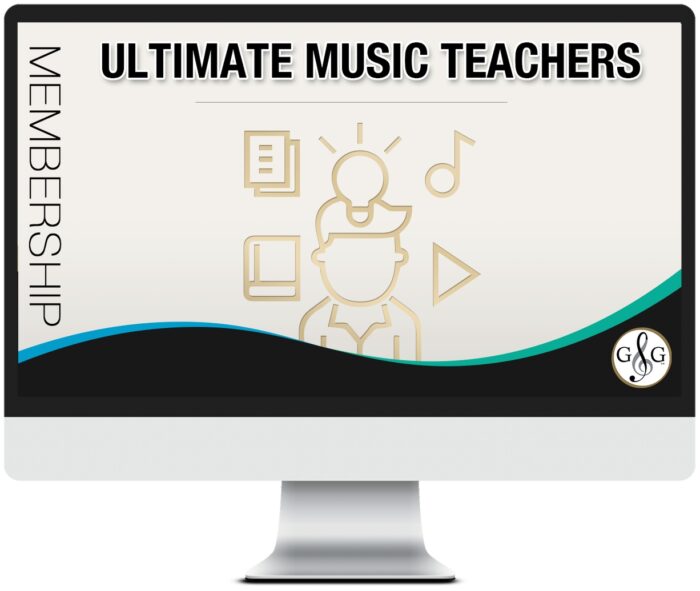


This is all wonderful information and application. I was never asked as a student to improvise or compose. Never gave it one thought. I am so glad it is taught in this course and has become looked at in a different light.
It is amazing to watch children become excited about composing and creating at the piano. Yesterday my Student (in Music Theory Beginner A Workbook) got all excited saying “YAY! I get to do another ICE!” (Imagine, Compose and Explore). Shelagh